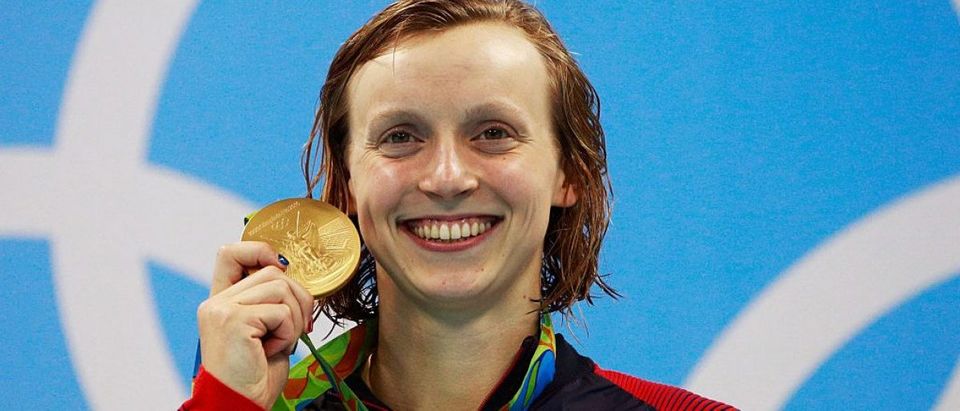Most Americans know that Michael Phelps won his 23rd Gold medal (and 28th medal overall) at the Rio Olympics, that Simone Biles became America’s newest gymnastics darling by winning four Gold medals and a Bronze and that Usain Bolt did what you’d expect somebody named Bolt to do and won his third straight Gold medal in the 100-meter, 200-meter and 100-meter relay.
But did you know that Kim Rhode became the first woman ever to medal in six consecutive Olympics when she won the Bronze in skeet shooting? She also became the first Summer Olympian to achieve that feat and the first to win medals on five continents.
Very impressive, but you may not have heard about Rhodes or her exploits, perhaps because she is a staunch supporter of gun rights who won her medals in shooting events. What’s worse to the media, she’s an enthusiastic supporter of Donald Trump.
Politics has always been a part of the Olympics. Who can forget Tommie Smith and John Carlos giving the Black Power salute at the 1968 Olympics or the Cold War overtones of the United States hockey team’s shocking victory over the Soviet Union in the 1980 Winter Games?
But identity politics seemed to predominate this year, at least for some in the media.
CNN host Kamau Bell called on Phelps, arguably the greatest Olympic athlete ever, to give up the honor of carrying the American flag during the opening ceremonies, in part, because of his white privilege.
In Bell’s view, “America has enough tall, successful, rich white guys hogging the spotlight trying to make America great … again.” Instead of Phelps, Bell wanted Ibtihaj Muhammad, a black Muslim fencer, to carry the flag.
Why Muhammad? Because she “would be nearly a one-stop inclusion shop. . . an African-American, hijab-wearing Muslim woman. . . Those are all groups that could always use some more love, acceptance, and respect from this country.”
That Bell could write such a column represents the triumph of identity politics in America.
Charges of racism and sexism are the principle means by which liberals have made identity politics such a powerful force in the culture and media.
To take one example from the Olympics, consider the uproar that ensued after Ellen DeGeneres tweeted a photo-shopped picture of her ridding on Usain Bolt’s back as he races to his 100-meter win with the caption, “This is how I’m running errands from now on.”
The tweet caused a backlash on social media and became one of the biggest stories at CNN, Fox News and other outlets. Some called the Tweet culturally insensitive, offensive and — wait for it — racist.
Then there was the outrage that followed this headline in the Greeley Tribune in Colorado: “Phelps ties for silver in 100 fly.” It then read, in smaller print underneath, “Ledecky sets world record in women’s 800 freestyle.”
What was the problem? Did the headline writer spell one of the athlete’s names wrong or attribute the wrong medal to one of them? No. The headline was deemed sexist because Phelps’ lesser achievement was featured more prominently than Ledecky’s.
There’s an argument to be made that Ledecky should have gotten top billing, but there’s no proof that sexism was the reason she didn’t. Plus there’s the fact that Phelps, as the most decorated athlete in Olympic history, is better known to readers, and so it made sense for the editors to feature him.
For some journalists and left-wing activists, the Olympics are about identity politics, all the time, so long as it’s an identity they approve of or want to promote.
Athletes themselves got into the act as well. An Egyptian Judo athlete refused to shake the hand of the Israeli participant who had just beaten him. He was reprimanded by the International Olympics Committee and sent home on the next flight to Cairo. A Saudi Judo athlete forfeited a match reportedly in order to avoid having to fight an Israeli in the next round.
But there were plenty of uplifting examples and inspirational moments, where performance, perseverance and patriotism trumped petty politics.
For example, freestyle swimmer Ryan Held broke down during national anthem. When asked why he was so emotional, Held said, “I’ve heard the national anthem hundreds of times, but as soon as that played it was just something different. The tears just started rolling down my face.”
There is Kathleen Baker, a female swimmer who overcame Crohn’s disease to win the silver medal in the 100-meter backstroke. After winning she said, “I definitely have been through my fair share of adversity. I think it really helps me appreciate the sport even more, knowing that it can be taken away from me. . . I hope I inspired a lot of people today.”
The Olympics are supposed to be a model of meritocracy — the pinnacle of sports talent. Olympism, the Olympic Charter states, “seeks to create a way of life based on the joy found in effort, the educational value of good example and respect for universal fundamental ethical principles.”
Those principles were featured prominently throughout the Games. Too bad some in the media didn’t seem to notice.
Former presidential candidate Gary Bauer is president of American Values and chairman of the Campaign for Working Families


